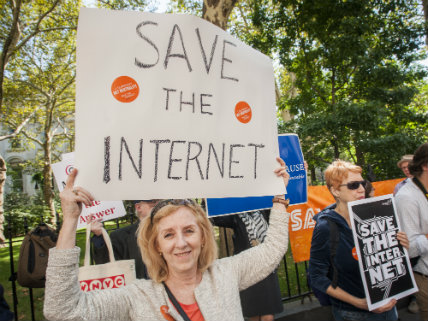FCC Vote Isn't the End of Net Neutrality, But It's a Good First Step
This isn't about whether the internet will be free and open. It's about how much power the FCC should have.

With a party-line vote Thursday, the commissioners of the FCC took the first step in what will be a months-long process to repeal Obama-era rules categorizing internet service providers as common carriers subject to federal regulations written in the 1920s.
It's not the end of the debate over net neutrality, and it's not the end of federal regulations for the internet. Instead, this is a first step towards eliminating a nonsensical legal justification for giving the FCC the authority to regulate internet service providers in the first place.
Technically, Thursday's vote did nothing more than open a period of public comment on reversing two legal claims, made in 2010 and 2015, that expanded the FCC's authority to regulate ISPs. After the public comment period closes, the FCC will be able to vote on revering those claims and effectively undoing the strained logic that the Obama administration used to asset those powers in the first place. The vote on actually reversing those policies probably won't happen for several months, at least.
"Today's vote isn't about net neutrality, but the FCC's legal authority over the internet," says Brian Szoka, president of Tech Freedom, a tech policy think tank that favors less regulation. "The real debate is over the FCC's power."
As Szoka points out, even after the FCC finishes the process of repealing the Obama-era rules, it won't be the end of government regulation of the Internet. The Federal Trade Commission, the Department of Justice, state attorneys general, and private attorneys will still be able to exert legal and political pressure on ISPs that breach contracts or otherwise violate the rule of law.
To understand what's happening at the FCC under new chairman Ajit Pai, it's useful to understand how we got to this point. During the Obama administration, FCC Chairman Tom Wheeler tried to impose net neutrality—twice—only to have federal courts block both efforts because the FCC lacked the authority to exert such broad control over ISPs. In response, the FCC in 2015 gave itself the authority (after privately working with the White House) to impose net neutrality by reclassifying ISPs as a Title II telecommunications service. With ISPs now subject to the same federal regulations as so-called "common carriers" like telephone services, a third attempt at imposing net neutrality survived a court challenge.
"Title II involves the panoply of heavy-handed economic regulations that were developed in the Great Depression to handle Ma Bell, the telephone monopoly of the 1930s," Pai told Reason TV last month. "My previous colleagues imposed those rules on the internet, one of the most dynamic systems we've ever known."
In short, the Obama administration found a clever way to get around limitations on the FCC's regulatory power. Thursday's vote is the first step towards putting the FCC's regulations back within those previous limits. As Pai points out, we weren't living in a digital dystopia in the years leading up to 2015.
Giving the FCC the sole regulatory authority over the Internet never made much sense. Since each new president can appoint new members to the commission, "the question of the FCC's legal authority will keep ping-ponging back and forth depending on which party controls the FCC," says Szoka. Just look at what's happened in the last few years. The FCC imposed net neutrality with party-line votes when a Democrat was in the White House and is now starting to repeal those rules with similar party-line votes from the new Republican majority.
That's no way to run anything, but it could have a particularly chilling effect on the development of the internet, which has grown in incredible and creative ways, in part, because of the lack of regulatory control exerted upon it. Worse, perhaps, than excessive regulatory control would be a lack of regulatory certainty, which would be the result of letting the FCC write and re-write rules for ISPs every four or eight years.
If there's a need and a public desire for net neutrality, those rules should be debated and passed by Congress. Congress could, for example, pass a law to prohibit ISPs from engaging in throttling or peering, and give enforcement authority to the FCC (or the FTC, which might actually make more sense).
Until and unless that happens, the Internet will be better off without a single government agency—and one with a track record that's hardly kind to freedom and free expression—handing itself a blank check to set rules for the web.


Show Comments (45)